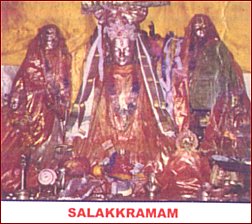|

The only religion which gives full freedom to its follower is Hinduism. There is no compulsion for the follower to visit a
temple , no compulsion for donations, no force for prayer. Hinduism says do not accept anything with out understanding it
completley. Encourages its follower to ask questions regarding the religion and its beliefs. Hinduism belives that all living
beings have souls. The ultimate goal of human being is to attain God. God is Paramatma(The Supreme soul) and living beings
are jeevatmas. The soul is eternal. Till it attains God, it takes birth and death. That is unavoidable. We get birth according
to our past actions(Karma). That is why our religion asks us to do always good things in life. Like echo we get back what
we say. Reep what we sow! The concept of karma or "law of karma" is the broader principle that all of life is governed
by a system of cause and effect, action and reaction, in which one's deeds have corresponding effects on the future. Karma
is thus a way of explaining evil and misfortune in the world, even for those who do not appear to deserve it - their misfortune
must be due to wrong actions in their previous life.
Karma is regarded as a fundamental law of nature that is automatic and mechanical. It is not something that is imposed
by God or a god as a system of punishment or reward, nor something that the gods can interfere with.
The word karma refers primarily to "bad karma" - that which is accumulated as a result of wrong actions. Bad
karma binds a person's soul (atman) to the cycle of rebirth (samsara) and leads to misfortune in this life and poor conditions
in the next. The moral energy of a particular moral act bears fruit automatically in the next life, manifested in one's class,
disposition, and character.
Hindu texts also prescribe a number of activities, such as pilgrimages to holy places and acts of devotion, that can wipe
out the effects of bad karma. Such positive actions are sometimes referred to as "good karma." Some versions of
the theory of karma also say that morally good acts have positive consequences (as opposed to simply neutral).
In Vedanta teachings, there are three types of karma:
1. Prarabdha karma - karma experienced during the present lifetime
2. Sancita karma - the store of karma that has not yet reached fruition
3. Agamin or sanciyama karma - karma sown in the present life that will come ripe in a future life.
The process by which karma is understood to work through various rebirths is as follows:
1. Good or bad actions create impressions (samskaras) or tendencies (vasanas) in the mind, which in time will come to
fruition in further action (more karma).
2. The seeds of karma are carried in the subtle body (linga), in which the soul transmigrates.
3. The physical body (sthula sarira) is the field in which the fruit of karma is experienced and more karma is created.
Hinduism embraces a great diversity of beliefs, a fact that can be initially confusing to westerners accustomed to creeds,
confessions, and carefully-worded belief statements. One can believe a wide variety of things about God, the universe and
the path to liberation and still be considered a Hindu.
This attitude towards religious belief has made Hinduism one of the more open-minded religions when it comes to evaluating
other faiths. Probably the most well-known Hindu saying about religion is: "Truth is one; sages call it by different
names."
However, there are some beliefs common to nearly all forms of Hinduism that can be identified, and these basic beliefs
are generally regarded as boundaries outside of which lies either heresy or non-Hindu religion. These fundamental Hindu beliefs
include: the authority of the Vedas (the oldest Indian sacred texts) and the Brahmam (ultimate God); the existence of an enduring
soul that transmigrates from one body to another at death (reincarnation); and the law of karma that determines one's destiny
both in this life and the next.
Note that a specific belief about God or gods is not considered one of the essentials, which is a major difference between
Hinduism and strictly monotheistic religions like Christianity, Judaism, Islam and Sikhism. Most Hindus are devoted followers
of one of the principal gods Shiva, Vishnu or Shakti, and often others besides, yet all these are regarded as manifestations
of a single Reality.
The ultimate goal of all Hindus is release (moksha) from the cycle of rebirth (samsara). For those of a devotional bent,
this means being in God's presence, while those of a philosophical persuasion look forward to uniting with God as a drop of
rain merges with the sea.
The purpose of life in Hinduism is thus to minimize bad karma in order to enjoy better fortune in this life and achieve
a better rebirth in the next. The ultimate spiritual goal is to achieve release (moksha) from the cycle of samsara altogether.
It may take hundreds or thousands of rebirths to get rid of all of one's accumulated karma and achieve moksha. The person
who has become liberated (attained moksha) creates no more new karma during the present lifetime and is not reborn after death.
Various methods to attain moksha are taught by different schools, but most include avoiding attachment to impermanent
things, carrying out one's duties, and realizing the ultimate unity between one's soul or self (atman) and ultimate reality
(Brahman).
In Hinduism, there is not just one purpose of human life, but four:
1. Dharma - fulfilling one's purpose
2. Artha - prosperity
3. Kama - desire, sexuality, enjoyment
4. Moksha - enlightenment.
Dharma
The Sanskrit word dharma means many things, including "law," "teaching" and "religion, righteous
path." In this context, it means one's purpose. In general, it says we should do things only by righteous path. Spend
our money for good. Let us always try to attain our goal only in righteous path. In Gita Krishna says " To which ever
dharma you belong ,leaving everything behind , you surrender unto Me alone , I will relieve you from all your sins, Do not
be afraid. So let us listen to Krishna and surrender to HIM.
Another aspect of dharma is paying the five debts. Hindus believe that they are born in debt to the gods and various humans,
and they must repay those karmic debts during their lifetime. The debts are:
1. Debt to the gods for their blessings; paid by rituals and offerings.
2. Debt to parents and teachers; paid by supporting them, having children of one's own and passing along knowledge.
3. Debt to guests; repaid by treating them as if they were gods visiting one's home.
4. Debt to other human beings; repaid by treating them with respect.
5. Debt to all other living beings; repaid by offering good will, food or any other help that is appropriate.
Dharma also means righteousness, or living morally and ethically at all times.
Artha: Prosperity
Artha is prosperity or success in worldly pursuits. Although the ultimate goal of Hinduism is enlightenment, the pursuit
of wealth and prosperity is regarded as an appropriate pursuit for the householder (the second of four life stages). It also
ensures social order, for there would be no society if everyone renunciated worldly life to meditate. But while Hindus are
encouraged to make money, it must be within the bounds of dharma.
Kama: desire
Kama (Sanskrit, "desire") primarily refers to romantic love and sexual pleasure, though it can refer to desire
in general. Like artha, kama is seen as an appropriate pursuit of the householder.
Moksha: Enlightenment
The ultimate goal of every Hindu's life is moksha, which can be understood in a variety of ways: liberation from rebirth,
enlightenment, Self-realization, or union with God. This is considered to the be the highest purpose of life, although very
few can achieve it in a single lifetime and there are a variety of paths to attain it.
|

